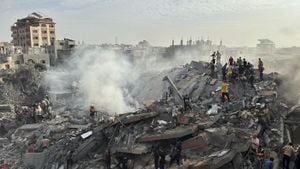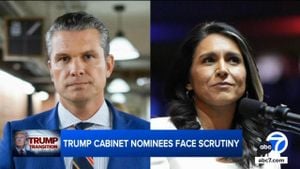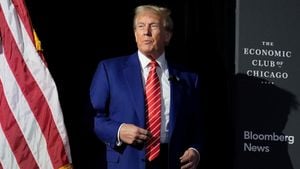Congress leaders Rahul Gandhi and Priyanka Gandhi Vadra made headlines on Wednesday as they attempted to visit the violence-stricken Sambhal district in Uttar Pradesh. Their effort to meet families affected by recent riots was thwarted by police barricades at the Ghazipur border. This incident has sparked outrage and has led to significant political backlash, highlighting the complex interplay of governance, civic rights, and political motives.
The unrest initially erupted on November 24 during a survey of the Shahi Jama Masjid by the Archaeological Survey of India (ASI), which had been commissioned following allegations from local court petitions claiming the mosque's site was originally the Harihar temple. This claim resulted in intense confrontations between protesters and security forces, culminating in violent clashes, resulting in at least four fatalities and numerous injuries.
Rahul and Priyanka's caravan was stopped as they tried to enter Sambhal. Their aim was to understand the situation on the ground personally and support the victims. Upon being halted, Rahul expressed his frustration, stating, "We are trying to go to Sambhal, the police is refusing, they are not allowing us. I am ready to go alone, I am ready to go with the police, but they did not accept either... My constitutional right is not being granted." Priyanka later echoed these sentiments, criticizing the law enforcement’s response, implying it displayed inadequacy rather than confidence, saying, "The police have no answer. Maybe the situation is such they cannot handle even this much."
Union Minister Pralhad Joshi, on the other hand, accused Congress leaders of trying to spark more chaos. He pointedly emphasized the government's stance, stating, "Everyone knows what Congress has done wherever it has formed government... There is a law and order issue in Sambhal, and they want to create unrest." This assertion reiterates the competing narratives surrounding the motives behind the visit—while Congress portrays it as fulfilling their duty to constituents, the BJP decries it as politically motivated uproar.
The public's reaction has been mixed. Some view the police's action as unconstitutional, infringing upon democratic rights. AIMIM leaders also took to the streets to protest against the alleged atrocities perceived to be directed toward Muslims following the Sambhal violence. Their demonstration occurred simultaneously with Congress's attempts to reach Sambhal, signaling the broader political ramifications and heightened tensions following the unrest.
Samajwadi Party MP Iqra Hasan added his voice to the chorus of criticism aimed at the government, arguing, "We just want to know what happened there and who are the people behind it... it seems like they are trying to hide something." This sentiment resonates loudly among the opposition, who believe transparency is imperative for restoring communal harmony.
Meanwhile, the Uttar Pradesh police have maintained their decision was rooted in safety concerns, enforcing prohibitory orders under Section 144 of the Code of Criminal Procedure (CrPC) to curb potential flare-ups. Sambhal’s District Magistrate, Rajendra Pensya, confirmed, "So far, 33 people have been sent to jail... More than 400 people have been identified, and we have requested everyone to avoid this area until December 10." This has stirred debate about the effectiveness and necessity of such measures during politically sensitive situations.
Countering the narrative voiced by the BJP, Congress President Mallikarjun Kharge passionately condemned the government’s actions on social media, claiming they reflect attempts to suppress dissent. He accused the ruling party of engaging in divisive politics, writing, "The BJP-RSS are busy tearing the Constitution to shreds with their divisive agenda." Kharge's remarks encapsulate growing concerns about the perceived erosion of democratic norms.
Shashi Tharoor, another Congress MP, chimed in, denouncing the blockade as unfair. He stated, "This is injustice; public representatives have the right to see and listen to the voices of the people." His statements aim to reinforce the notion of decision-making being rooted not just within party lines but as part of wider civic engagement.
Moving forward, Congress leaders, including those from the broader INDIA coalition, have stated plans to continue pressing the issue in various legislative forums, indicating their commitment to addressing the aftermath of the violence and governmental responses. The protests and political maneuvering reflect how deeply ingrained the issues surrounding religious sites and communal tensions are within the fabric of India’s political climate.
The Sambhal incident serves as a vivid illustration of how the historical and current tensions surrounding religious sites can ignite violent confrontations. The police's decision to restrict access to opposition leaders brings forth significant questions about governance and the role of political parties during periods of communal unrest. The narrative continues to evolve as the opposition pledges to advocate for the victims, pushing for accountability and transparency amid rising political tensions.



